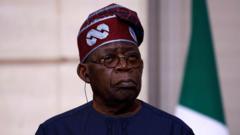### Summary: As President Tinubu fills key government roles, accusations of ethnic favoritism are growing, raising alarms about Nigeria's historic balancing act among its diverse groups.
### Title: Nigeria's Ethnic Neutrality at Risk: Tinubu's Unfolding Appointment Controversy

### Title: Nigeria's Ethnic Neutrality at Risk: Tinubu's Unfolding Appointment Controversy
### Description: Concerns are mounting over the potential erosion of Nigeria's delicate ethnic balance in government under President Bola Tinubu's administration.
In Nigeria, political advancement has traditionally depended on maintaining an equitable balance between the country's myriad ethnic and religious factions. Recently, however, sharp criticism has emerged questioning whether this principle is being upheld under President Bola Tinubu, who has been in office for two years. While Nigeria's constitution ensures representation across regions in cabinet roles, many fear that Tinubu's appointments may show a preference for his own Yoruba ethnic group.
Tinubu's selections have been scrutinized, particularly since he opted for another Muslim, despite ongoing traditions advocating for a diverse Muslim-Christian ticket. Some observers argue that the president's lineup reflects a worrying trend of consolidating power among the Yoruba, a claim that the presidency staunchly denies.
Nigeria boasts over 250 ethnic groups, with Hausa-Fulanis, Igbo, and Yoruba as the most populous. The country has had a history steeped in tension that risks destabilizing its unity—hence public apprehension intensifies when the president makes decisions regarding essential appointments. With critical positions now dominated entirely by individuals from the Yoruba group, from the heads of national security to economic agencies, fears of favoritism have escalated.
The recent appointment of Bayo Ojulari, a Yoruba, to head the Nigerian National Petroleum Company (NNPC)—previously led by a northerner—has stirred discussions about the implications of a singular ethnic group holding such power. Such a reality raises the specter of sustained discontent across the nation.
Historical comparisons reveal that predecessors Goodluck Jonathan and Muhammadu Buhari, while not void of bias, did not reflect the same ethnic concentration in their early administrations. Political analysts caution that this unusual trend could diminish trust in democracy and exacerbate disillusionment among other ethnic groups—particularly those from the north, where most of Tinubu's key appointments have come at the expense of northerners.
Senator Ali Ndume, a member of Tinubu's own party, has voiced similar concerns, indicating that the appointments do not align with the administration's promise to represent the country comprehensively. Critics point out the lack of women among these key positions, compounding the exclusion of significant demographics.
In response to growing discontent, Tinubu's administration maintains that it is committed to fair representation, though critics remain skeptical. Political analysts emphasize the need for leaders to choose the best candidates regardless of ethnicity while acknowledging that Nigerian politics continues to grapple with the lingering legacies of ethnic division. Solutions may lie ahead, but they will require careful leadership and a commitment to unity across Nigeria's diverse communities.

















